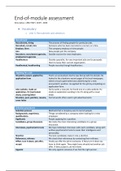Summary
Samenvatting: English for Business and Economics Vocabulary Grammar
- Course
- Institution
- Book
Summary of the vocabulary and grammar to be known for the course English for Business and Economics. All words are listed with a short explanation or example sentence. The grammar is briefly overrun with a short example each time. All explanations are always in English because this is the best way ...
[Show more]




